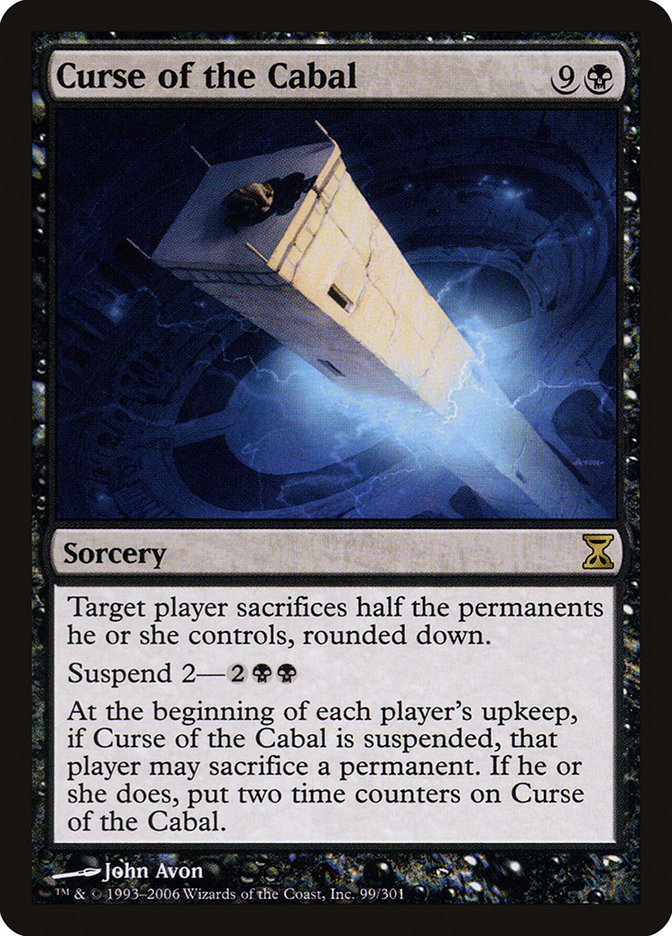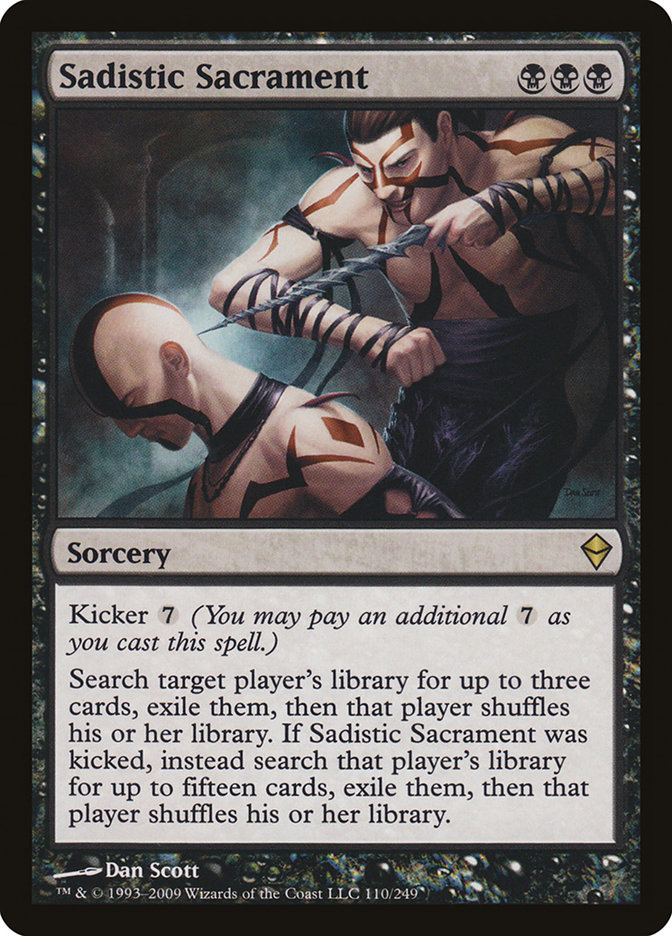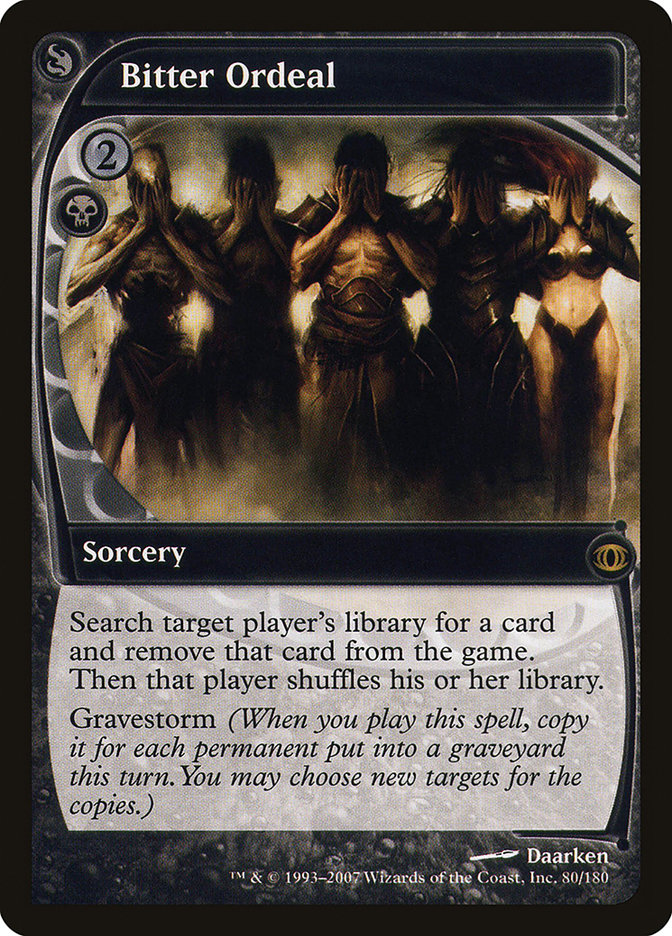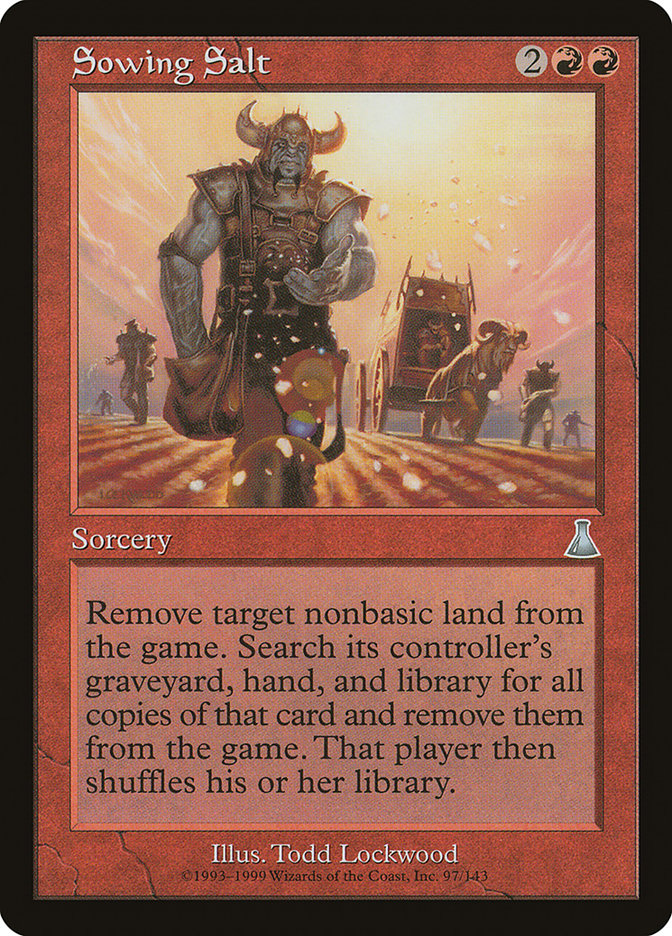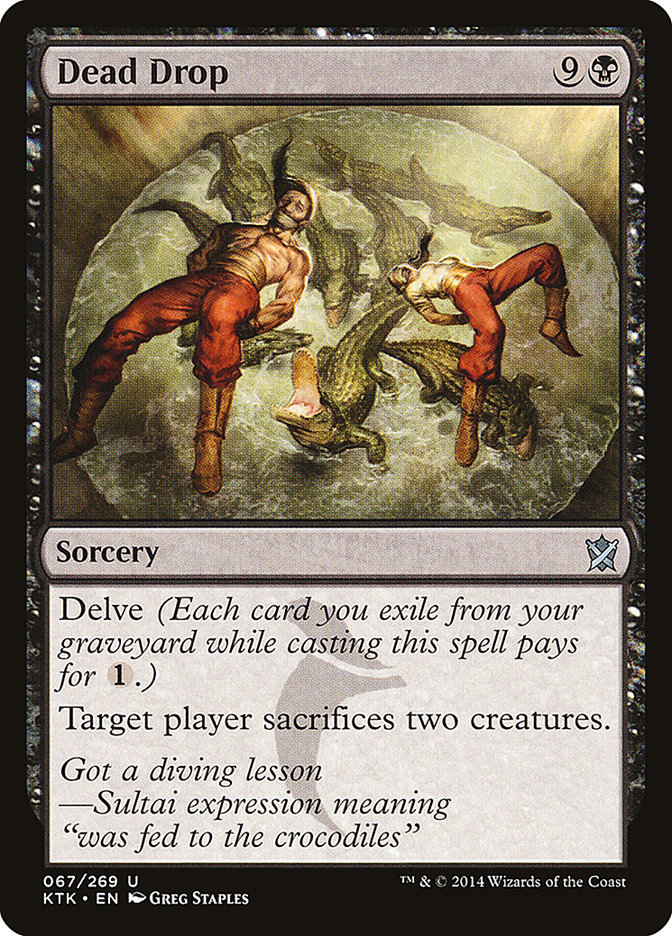Maldición de la Cábala Carta MTG
| El coste de maná | |
| Costo de maná convertido | 10 |
| Rareza | Extraña |
| Tipo | Conjuro |
| Habilidades | Suspend |
| Liberado | 2006-10-06 |
| Coleccione símbolo | |
| Coleccione nombre | Time Spiral |
| Coleccione código | TSP |
| Número | 99 |
| Frame | 2003 |
| Disposición | Normal |
| Border | Negra |
| Ilustrado por | John Avon |
Texto de la carta
El jugador objetivo sacrifica la mitad de los permanentes que controla, redondeado hacia abajo. Suspender 2—{2}{B}{B} Al comienzo del mantenimiento de cada jugador, si la Maldición de la Cábala está suspendida, ese jugador puede sacrificar un permanente. Si lo hace, pon dos contadores de tiempo sobre la Maldición de la Cábala.
Un ojo de tumba puede permanecer cerrado por siglos. Se abre cuando ve un mundo torcido y hueco como el engendro bajo su párpado.
Cartas Similares
La Maldición de la Cábala es una carta única que ha intrigado a muchos jugadores de Magic: The Gathering con su efecto potencialmente alterador del juego. Asemejándose a cartas como Sacramentos Sadistas en su habilidad para interrumpir la estrategia de un oponente, la Maldición de la Cábala va un paso más allá amenazando con un sacrificio continuo a menos que se interrumpa. A diferencia de Sacramentos Sadistas, que ofrece una extracción única de cartas clave del mazo de un oponente, la tensión de la Maldición de la Cábala aumenta con cada uno de tus turnos a medida que avanza el juego.
Otro hechizo relacionado es el juicio amargo, que también se adentra en el reino de los cementerios, permitiendo la eliminación de múltiples cartas a la vez. Mientras que el juicio amargo se basa en el mecanismo de tormenta en la tumba, ganando poder a medida que más cartas van al cementerio, la Maldición de la Cábala puede convertirse en un dilema recurrente. Mientras tanto, Saltando la Siembra ofrece un enfoque más directo, exiliando cartas seleccionadas del mazo y cementerio de un jugador sin suspenso pero sin ofrecer ninguna amenaza continua.
Al analizar la Maldición de la Cábala junto con sus contrapartes, su prolongada y estratégica contribución al juego destaca en el panorama de cartas de interrupción en Magic: The Gathering, afirmando su valor a través del potencial control del tablero e impacto psicológico.
Cartas similares a Maldición de la Cábala por color, tipo y coste de maná
Aspectos positivos de la carta
Ventaja de cartas: La Maldición de la Cabala es conocida por perturbar a los oponentes al obligarlos a sacrificar cartas permanentes. Esto crea una ventaja de cartas sustancial al disminuir sistemáticamente los recursos de tu oponente sin gastar directamente tus cartas.
Aceleración de recursos: Aunque no es una herramienta directa de aceleración de recursos, al presionar a los oponentes para que actúen o pierdan recursos clave, la Maldición de la Cabala puede acelerar indirectamente tu posición como el jugador dominante, haciendo que tus jugadas futuras sean más impactantes.
Velocidad instantánea: Aunque no es un instantáneo en sí mismo, la Maldición de la Cabala puede sincronizarse con otras cartas que tienen capacidades de velocidad instantánea. Al combinarla con cartas que permiten la interacción a velocidad instantánea, puedes sincronizar tus jugadas con la Maldición de la Cabala para coincidir con tus jugadas a velocidad instantánea, atrapando a tu oponente en su momento más vulnerable y aumentando la presión.
Aspectos negativos de la carta
Costo de mana específico: La Maldición de la Cabala requiere una cantidad sustancial de mana negro, necesitando dos negros y ocho genéricos, lo que puede ser una inversión pesada y limitar la flexibilidad de la carta en varios tipos de mazos.
Costo de maná comparativamente alto: Con un costo total de diez de maná, la Maldición de la Cabala es uno de los hechizos más costosos de lanzar. Esto puede ser particularmente desafiante ya que compite con otras cartas de alto impacto que podrían ser jugadas antes o tener un efecto inmediato en el estado del juego.
Requisito de descarte: Aunque esta carta no tiene un requisito directo de descarte, le ofrece a los oponentes la opción de sacrificar permanentes para retrasar su efecto devastador. Esta elección puede indirectamente forzarte a descartar recursos valiosos en un intento por contrarrestar o mitigar los sacrificios que elija hacer tu oponente.
Razones para incluir en tu colección
Versatilidad: La Maldición de la Cabala ofrece un enfoque dinámico a la construcción de mazos, con su capacidad de perturbar las estrategias del oponente ya sea que optes por suspenderla o lanzarla directamente. Puede ser un cambio de juego en mazos de control o tipo stax que buscan restringir las jugadas del oponente.
Potencial de combo: Esta sorbería brilla en mazos que aprovechan contadores de tiempo o mecánicas de sacrificio. También puede ser parte de un combo que obligue a un oponente a sacrificar permanentes cruciales, inclinando la balanza a tu favor.
Relevancia en la meta: A medida que el juego evoluciona, también lo hacen los mazos que dominan la partida. La Maldición de la Cabala tiene el poder de sacudir la meta desafiando mazos populares que dependen en gran medida de permanentes específicos, convirtiéndola en un candidato potencial para el banquillo lateral para superar a tu competencia.
Cómo vencer
La Maldición de la Cabala es una carta de sortilegio poderosa que se cierne sobre el juego, poniendo un reloj en los recursos de tu oponente. La naturaleza suspensiva de la carta, con su mecánica de cuenta atrás, puede presionar a los adversarios para que tomen decisiones difíciles. Cuando te enfrentas al sacrificio inminente de permanentes, la clave para superar esta carta desafiante radica en la previsión estratégica y la gestión de recursos.
Una estrategia efectiva es mantener una reserva de permanentes desechables, asegurando que tengas activos menos valiosos para sacrificar cuando se retire el contador de la Maldición de la Cabala. Además, incorporar cartas que puedan contrarrestar o eliminar encantamientos y sortilegios directamente de la pila te dará una oportunidad contra esta carta de alto riesgo. Por último, aumentar la velocidad de tu mazo para aplicar presión y reducir la ventana de oportunidad de tu oponente para maximizar el potencial de la Maldición de la Cabala también puede inclinar la balanza a tu favor.
En última instancia, enfrentar la Maldición de la Cabala requiere una evaluación tranquila de tus recursos, una interrupción bien cronometrada y un plan de juego proactivo. Al priorizar estas tácticas, puedes mitigar el impacto de la maldición y mantener el control del juego.
Donde comprar
Si estás buscando comprar una carta MTG Maldición de la Cábala de un coleccione específico como Time Spiral, existen varias opciones confiables que debes considerar. Una de las fuentes principales es tu tienda de juegos local, donde a menudo puedes encontrar paquetes de refuerzo, cartas individuales y mazos preconstruidos de colecciones actuales y pasadas. A menudo ofrecen el beneficio adicional de una comunidad donde puedes intercambiar con otros jugadores.
Para un inventario más amplio, particularmente de colecciones más antiguos, mercados en línea como TCGPlayer, Card Kingdom y Card Market ofrecen amplias selecciones y te permiten buscar cartas de colecciones específicos. Las plataformas de comercio electrónico más grandes como eBay y Amazon también tienen listados de varios vendedores, lo que puede ser un buen lugar para buscar productos sellados y hallazgos raros.
Además, el sitio oficial de Magic suele tener un localizador de tiendas y listas de minoristas para encontrar Wizards of the Productos con licencia costera. Recuerde comprobar la autenticidad y el estado de las cartas al comprarlas, especialmente a vendedores individuales en mercados más grandes.
A continuación se muestra una lista de algunos sitios web de tiendas donde puede comprar las Maldición de la Cábala y otras cartas MTG:
 COMPRAR
COMPRAR BurnMana es un socio oficial de TCGPlayer
- eBay
- Card Kingdom
- Card Market
- Star City Games
- CoolStuffInc
- MTG Mint Card
- Hareruya
- Troll and Toad
- ABU Games
- Card Hoarder Magic Online
- MTGO Traders Magic Online
Ver productos MTG
Legalidades
Formatos de Magic the Gathering donde Maldición de la Cábala tiene restricciones
| Formato | Legalidad |
|---|---|
| Commander | Legal |
| Legacy | Legal |
| Modern | Legal |
| Oathbreaker | Legal |
| Vintage | Legal |
| Duel | Legal |
| Predh | Legal |
| Penny | Legal |
Reglas e información
La guía de referencia para las reglas de las cartas Maldición de la Cábala de Magic: The Gathering proporciona las reglas oficiales, las erratas emitidas, así como un registro de todas las modificaciones funcionales que se han producido.
| Fecha | Texto |
|---|---|
| 18/06/2021 | Al resolverse la segunda habilidad desencadenada, debes lanzar la carta si puedes hacerlo. Debes hacerlo incluso si requiere objetivos y los únicos objetivos legales son aquellos que realmente no deseas seleccionar. Se ignoran los permisos de tiempo basados en el tipo de carta. |
| 18/06/2021 | Las cartas desterradas con la habilidad de suspender se destierran boca arriba. |
| 18/06/2021 | Exiliar una carta con esfuerzo no es lanzar esa carta. Esta acción no utiliza la pila y no se puede responder a ella. |
| 18/06/2021 | Si un efecto se refiere a una "carta suspendida", eso significa una carta que (1) tiene la habilidad de suspender, (2) está en el exilio, y (3) tiene uno o más contadores de tiempo sobre ella. |
| 18/06/2021 | Si la carta tiene en su coste de maná, debes elegir 0 como el valor de X al lanzarla sin pagar su coste de maná. |
| 18/06/2021 | Si se contrarresta la primera habilidad activada de suspender (la que elimina contadores de tiempo), no se eliminará ningún contador de tiempo. La habilidad se activará nuevamente al comienzo del próximo mantenimiento del propietario de la carta. |
| 18/06/2021 | Si la segunda habilidad activada es contrarrestada, la carta no se puede lanzar. Permanece exiliada sin contadores de tiempo, y ya no está suspendida. |
| 18/06/2021 | Si el hechizo requiere cualquier objetivo, esos objetivos se eligen cuando finalmente se lanza el hechizo, no cuando se exilia. |
| 18/06/2021 | Si no puedes lanzar la carta, quizás porque no hay objetivos legales disponibles, esta permanece desterrada sin contadores temporales y ya no está suspendida. |
| 18/06/2021 | Si lanzas una carta "sin pagar su coste de maná", como con suspender, no puedes elegir lanzarla por ningún otro coste alternativo. Sin embargo, puedes pagar costes adicionales. Si la carta tiene algún coste adicional obligatorio, debes pagar esos si deseas lanzar la carta. |
| 18/06/2021 | Suspend es una palabra clave que representa tres habilidades. La primera es una habilidad estática que te permite exiliar la carta de tu mano con el número especificado de contadores de tiempo (el número antes del guion) pagando su coste de suspensión (listado después del guion). La segunda es una habilidad desencadenada que elimina un contador de tiempo de la carta suspendida al comienzo de cada uno de tus mantenimientos. La tercera es una habilidad desencadenada que te hace lanzar la carta cuando se elimina el último contador de tiempo. Si lanzas una carta de criatura de esta manera, obtiene prisa hasta que pierdas el control de esa criatura (o, en casos raros, pierdas el control de la carta de criatura mientras está en la pila). |
| 18/06/2021 | El valor de maná de un hechizo lanzado sin pagar su coste de maná se determina por su coste de maná, aunque ese coste no se haya pagado. |
| 18/06/2021 | Cuando se retire el último contador de tiempo, se activa la segunda habilidad desencadenada de suspensión (la que te permite lanzar la carta). No importa por qué se retiró el último contador de tiempo o qué efecto lo eliminó. |
| 18/06/2021 | Nunca estás obligado/a a activar habilidades de maná para pagar costos, por lo que si hay un costo adicional de maná obligatorio (como el de Thalia, Guardiana de Thraben), puedes optar por no activar habilidades de maná para pagarlo y, por lo tanto, no lograr lanzar la carta suspendida, dejándola en el exilio. |
| 18/06/2021 | Puedes desterrar una carta de tu mano usando la habilidad de suspender en cualquier momento en que pudieras lanzar esa carta. Considera su tipo de carta, cualquier efecto que modifique cuándo puedes lanzarla (como prisa) y cualquier otro efecto que te impida lanzarla (como la habilidad del Mago entrometido) para determinar si y cuándo puedes hacerlo. Si podrías completar realmente todos los pasos para lanzar la carta es irrelevante. Por ejemplo, puedes desterrar una carta con suspender que no tenga coste de mana o que requiera un objetivo incluso si no hay blancos legales disponibles en ese momento. |
